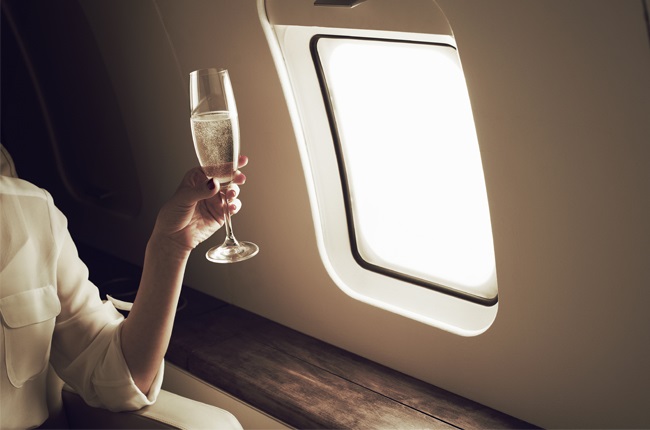
- Consuming alcohol on a plane may leave you feeling drunker than you would be on the ground.
- The body reacts differently to alcohol in the air because of the lower levels of oxygen in your bloodstream.
- The physical effects of alcohol may take affect a lot faster because of this.
A few years ago, I sat on a flight from Cape Town to Johannesburg. While I regularly travel between the two provinces, this particular flight still stands out for one reason - a drunk passenger. I'm talking verbal diarrhoea, hurling insults, can't-sit-still drunk.
The gentleman in question was quite talkative from the start of the two-hour flight, which caught my attention early on. He seemed friendly and in a good mood as he made polite conversation with the stranger next to him. But then, just a few drinks later, everything changed. I remember thinking, how on earth did he get that drunk that quickly? Turns out, it's because we were in the air.
In a recent press statement, KLM Airlines explained why passengers who consume alcohol on board a flight might feel the effects of it a lot faster than they would on the ground.
But before we get to that, let's first break down how alcohol gets you drunk in the first place.
Ethanol is the primary ingredient in alcoholic beverages and the reason behind your buzz. Once the concentration of alcohol in your bloodstream increases, you will have an increase in dopamine and serotonin, the "feel good" hormones.
But as you continue drinking, alcohol depresses your central nervous system and affects how your brain processes information. You may start to note physical symptoms like slurred speech or loss of coordination.
READ MORE | Sober curious: What does it mean and where do I even begin?
Why do you get drunk faster on a plane?
"When on a plane, the barometric pressure in the cabin of a plane is lower than it normally is. This decreased pressure means that the body finds it harder to absorb oxygen - this can produce light-headedness or hypoxia [deficiency in the amount of oxygen reaching the tissues]," Dr Clare Morrison told Huffington Post UK.
This feeling is usually not an issue. But it is the reason alcoholic beverages may start to take effect a lot sooner than normal.
"In other words, because of the lower level of oxygen in your blood, you may seem more drunk in the air than you would on the ground after consuming the same amount of alcohol," the KLM release explains.
Funny enough, your blood alcohol content (or BAC) will show the same percentage as it would if you had the same amount to drink on the ground.
Another factor to consider is that the air on a plane is very dry. That, "coupled with the diuretic effect of drinking alcohol", may dehydrate you faster. So make sure you're drinking enough water if you decide to consume alcohol on your next flight.




 Publications
Publications
 Partners
Partners












